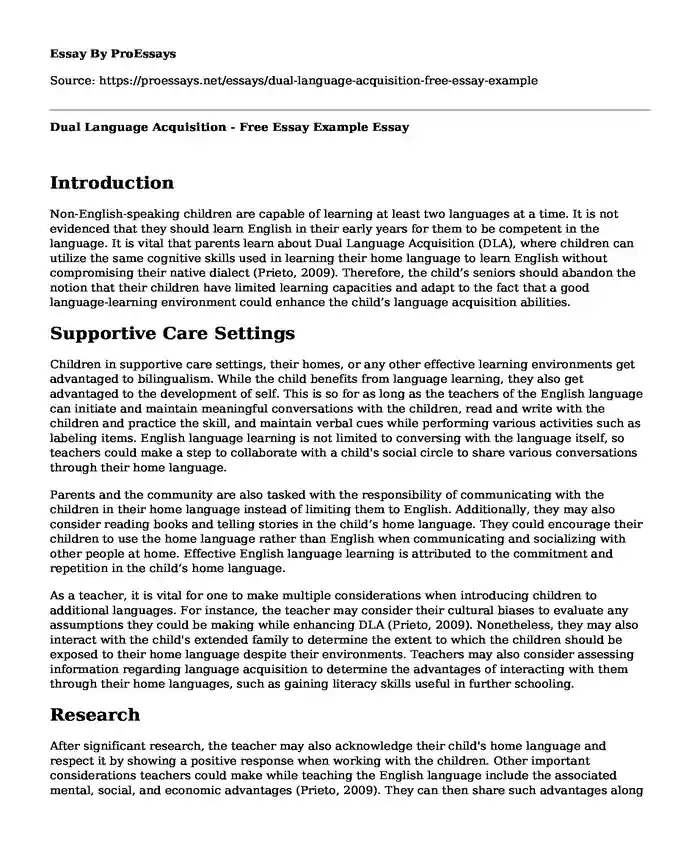Introduction
Non-English-speaking children are capable of learning at least two languages at a time. It is not evidenced that they should learn English in their early years for them to be competent in the language. It is vital that parents learn about Dual Language Acquisition (DLA), where children can utilize the same cognitive skills used in learning their home language to learn English without compromising their native dialect (Prieto, 2009). Therefore, the child’s seniors should abandon the notion that their children have limited learning capacities and adapt to the fact that a good language-learning environment could enhance the child’s language acquisition abilities.
Supportive Care Settings
Children in supportive care settings, their homes, or any other effective learning environments get advantaged to bilingualism. While the child benefits from language learning, they also get advantaged to the development of self. This is so for as long as the teachers of the English language can initiate and maintain meaningful conversations with the children, read and write with the children and practice the skill, and maintain verbal cues while performing various activities such as labeling items. English language learning is not limited to conversing with the language itself, so teachers could make a step to collaborate with a child's social circle to share various conversations through their home language.
Parents and the community are also tasked with the responsibility of communicating with the children in their home language instead of limiting them to English. Additionally, they may also consider reading books and telling stories in the child’s home language. They could encourage their children to use the home language rather than English when communicating and socializing with other people at home. Effective English language learning is attributed to the commitment and repetition in the child’s home language.
As a teacher, it is vital for one to make multiple considerations when introducing children to additional languages. For instance, the teacher may consider their cultural biases to evaluate any assumptions they could be making while enhancing DLA (Prieto, 2009). Nonetheless, they may also interact with the child's extended family to determine the extent to which the children should be exposed to their home language despite their environments. Teachers may also consider assessing information regarding language acquisition to determine the advantages of interacting with them through their home languages, such as gaining literacy skills useful in further schooling.
Research
After significant research, the teacher may also acknowledge their child's home language and respect it by showing a positive response when working with the children. Other important considerations teachers could make while teaching the English language include the associated mental, social, and economic advantages (Prieto, 2009). They can then share such advantages along with working strategies to the child’s parents to boost their learning process. The teacher could also consider utilizing school resources to let the child’s parents enhance English language learning.
Conclusion
I will apply the information in my future classroom to encourage learning by concentrating more on the infant’s home language. DLA would be significant in the classroom as it would ensure that the children learn English as a second language while developing on the skills related to their home language. I will use the information to boost the child's self-esteem and assist them in remaining connected to their original cultures by avoiding common assumptions made in the classroom. I will utilize the information to empower my students, especially in their cognitive skills, and in the aspects of long term memory, attention span, and problem-solving.
References
Prieto, V. H. (2009). One Language, Two Languages, Three Languages . . . More? National Association for the Education of Young Children.
Cite this page
Dual Language Acquisition - Free Essay Example. (2023, Nov 06). Retrieved from https://proessays.net/essays/dual-language-acquisition-free-essay-example
If you are the original author of this essay and no longer wish to have it published on the ProEssays website, please click below to request its removal:
- The Role of Fate in My Life Essay Example
- Social Media and Social Development Paper Example
- Essay on Understanding Turner Syndrome: A Chromosomal Abnormality Affecting Females
- Max Cost Efficiency: 3 Functions Explained
- Paper Sample on 10+ Years Experienced Finance & Accounting Manager
- Essay Example on Careful Planning: The Key to Excellent Teaching
- Report Evaluating Opioid Prevention Programs in Elementary Schools: Considerations and Methodology







